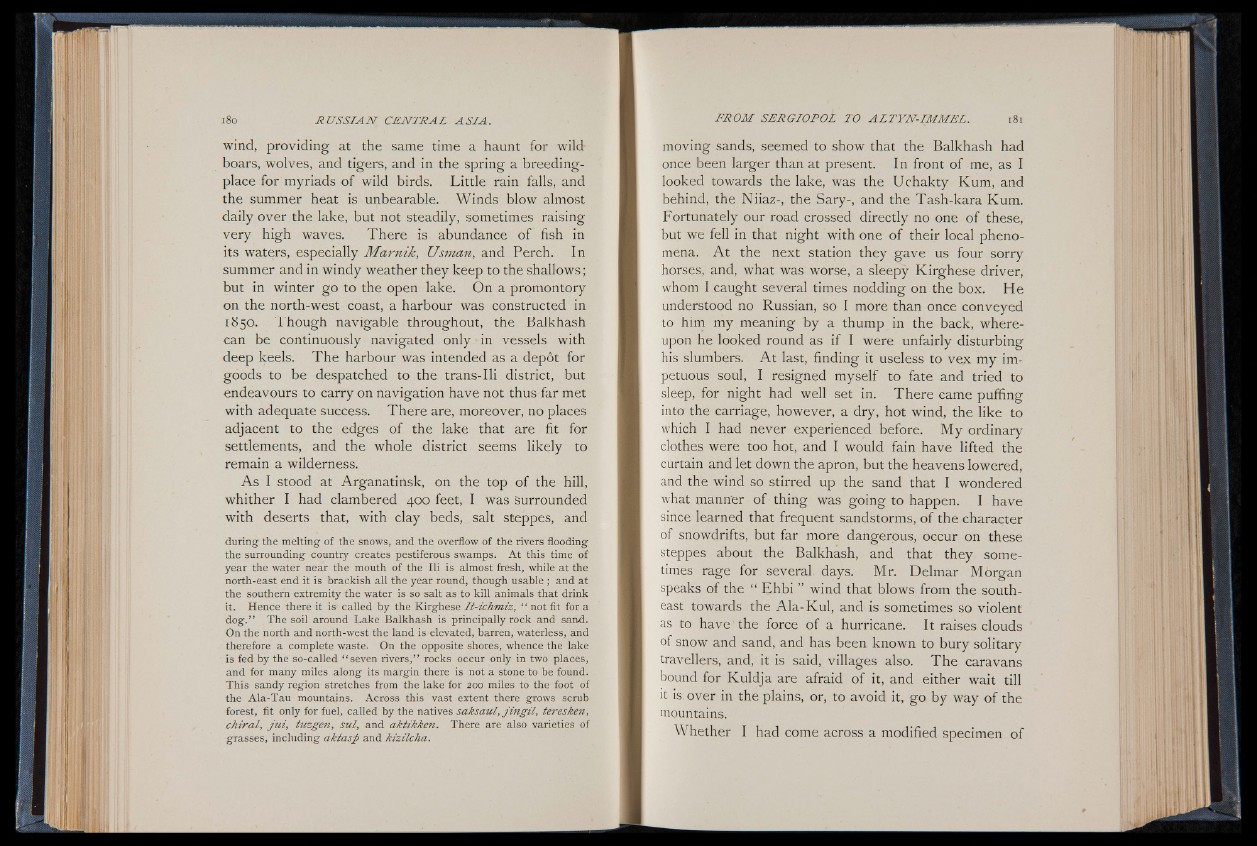
wind, providing at the same time a haunt for wild-
boars, wolves, and tigers, and in the spring a breeding-
place for myriads of wild birds. Little rain falls, and
the summer heat is unbearable. Winds blow almost
daily over the lake, but not steadily, sometimes raising
very high waves. There is abundance of fish in
its waters, especially Marnik, Usman, and Perch. In
summer and in windy weather they keep to the shallows ;
but in winter go to the open lake. On a promontory
on the north-west coast, a harbour was constructed in
1850. Though navigable throughout, the Balkhash
can be continuously navigated only in vessels with
deep keels. The harbour was intended as a dépôt for
goods to be despatched to the trans-Ili district, but
endeavours to carry on navigation have not thus far met
with adequate success. There are, moreover, no places
adjacent to the edges of the lake that are fit for
settlements, and the whole district seems likely to
remain a wilderness.
As I stood at Arganatinsk, on the top of the hill,
whither I had clambered 400 feet, I was surrounded
with deserts that, with clay beds,, salt steppes, and
during the melting of the snows, and the overflow of the rivers flooding
the surrounding country creates pestiferous swamps. A t this time of
year the water near the mouth of the Hi is almost fresh, while at the
north-east end it is brackish all the year round, though usable ; and at
the southern extremity the water is so salt as to kill animals that drink
it. Hence there it is called by the Kirghese It-ichmiz, “ not fit for a
d o g .” The soil around Lake Balkhash is principally rock and sand.
On the north and north-west the land is elevated, barren, waterless, and
therefore a complete waste. On the opposite shores, whence the lake
is fed by the so-called “ seven rivers,” rocks occur only in two places,
and for many miles along its margin there is not a stone to be found.
This sandy region stretches from the lake for 200 miles to the foot of
the A la-Tau mountains. Across this vast extent there grows scrub
forest, fit only for fuel, called by the natives saksaul, jin g il, teresken,
chiral, ju i , tuzgen, Sul, and aktikken. There are also varieties of
grasses, including aktasj) and kizilcha.
moving sands, seemed to show that the Balkhash had
once been larger than at present. In front of me, as I
looked towards the lake, was the Uchakty Kum, and
behind, the Niiaz-, the Sary-, and the Tash-kara Kum.
Fortunately our road crossed directly no one of these,
but we fell in that night with one of their local phenomena.
A t the next station they gave us four sorry
horses, and, what was worse, a sleepy Kirghese driver,
whom I caught several times nodding on the box. He
understood no Russian, so I more than once conveyed
to him my meaning by a thump in the back, whereupon
he looked round as if I were unfairly disturbing
his slumbers. A t last, finding it useless to vex my impetuous
soul, I resigned myself to fate and tried to
sleep, for night had well set in. There came puffing
into the carriage, however, a dry, hot wind, the like to
which I had never experienced before. My ordinary
clothes were too hot, and I would fain have lifted the
curtain and let down the apron, but the heavens lowered,
and the wind so stirred up the sand that I wondered
what manner of thing was going to happen. I have
since learned that frequent sandstorms, of the character
of snowdrifts, but far more dangerous, occur on these
steppes about the Balkhash, and that they sometimes
rage for several days. Mr. Delmar Morgan
speaks of the “ Ehbi ” wind that blows from the southeast
towards the Ala-Kul, and is sometimes so violent
as to have the force of a hurricane. It raises clouds
of snow and sand, and has been known to bury solitary
travellers, and, it is said, villages also. The caravans
bound for Kuldja are afraid of it, and either wait till
it is over in the plains, or, to avoid it, go by way of the
mountains.
Whether I had come across a modified specimen of